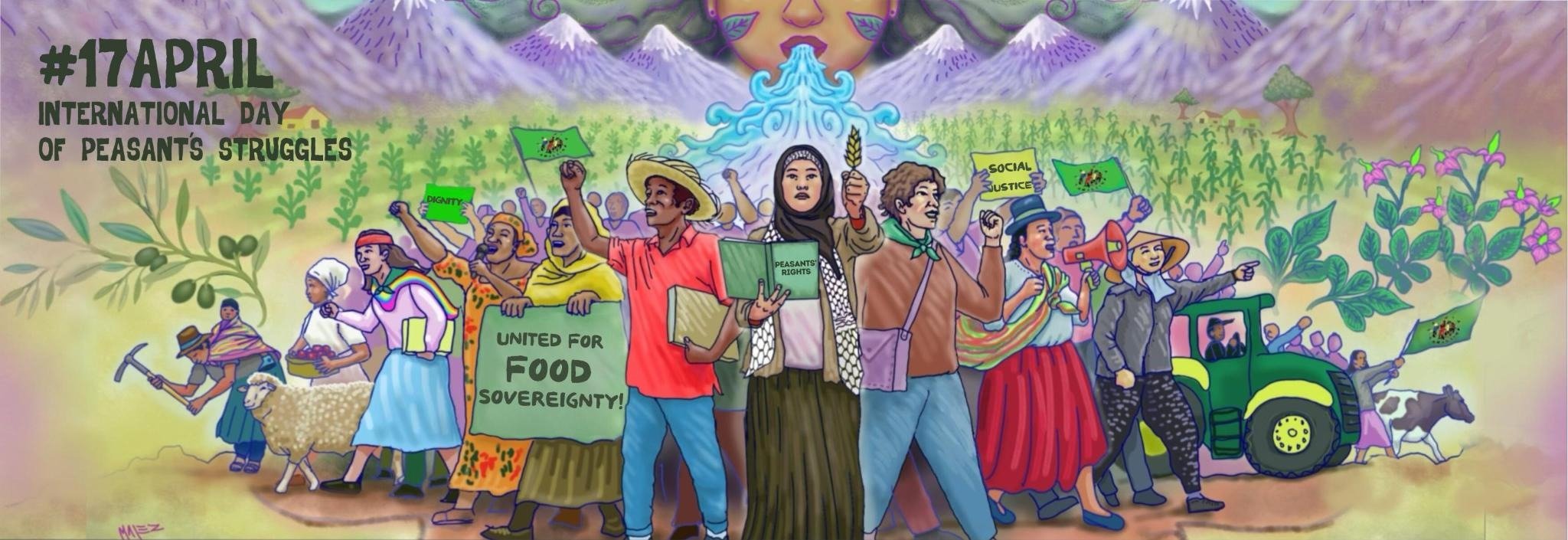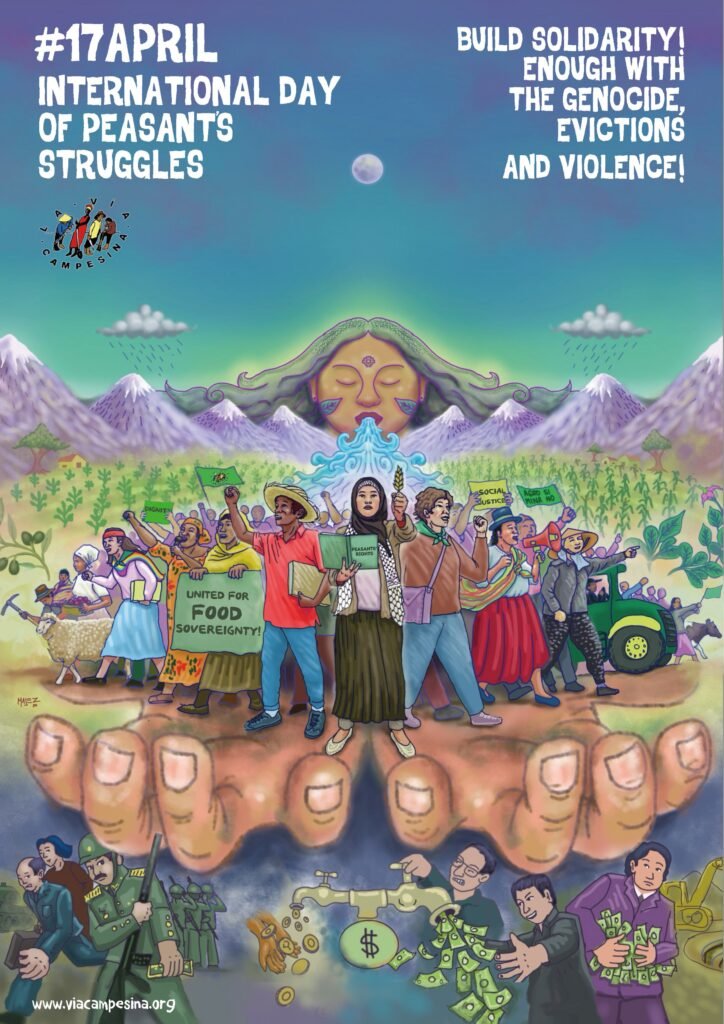Call to Action – #17April: International Day of Peasant Struggles

April 17, 2024 – International Day of Peasant Struggles
Bagnolet, March 21, 2024 | On April 17, we mark the International Day of Peasant Struggles, our annual action day that brings us together to commemorate the Eldorado do Carajás* massacre in 1996 and to honor the resistance of peasants worldwide who persist in their struggle for social justice and dignity.
Following our 8th international conference last December, we, peasants, youth, women, men, and diversities, migrants, rural and landless workers, fisherfolk, and indigenous peoples, stand with renewed hope and strength, heightened awareness, unwavering commitment, organized unity, and determination to confront the multifaceted crises. We continue an unwavering fight against genocides, wars, violations of people’s sovereignty, evictions of peasant families, the criminalization and persecution of peasants and their leaders, as well as extractivism and violations of peasants’ rights. United, we safeguard our mother earth against the grip of agribusiness multinationals, neocolonialists, fascists, and repressive military forces.
This devastation involves various actors in the shadows, notably neoliberal institutions such as the WTO, the World Bank, and the International Monetary Fund. Their interference in national agricultural policies, related to trade, and social protections, is evident. Free trade agreements (FTAs) and other economic partnership frameworks imposing neoliberal conditions linked to loans and financial assistance programs, or measures favoring the interests of corporations, jeopardize the livelihoods of peasants, agricultural workers, and migrants. Yet, it is the peasants who provide sustenance to 70% of the global population with healthy and quality food.

Enough with the genocide, evictions and violence!
Today, the world witnesses multiple crises affecting every aspect of life on Earth. The capitalist system now reveals its true destructive nature, driving peasants in Asia and other parts of the world to suicide due to unpayable debts. It corrupts governments in the interest of a few elites, violating nature and ecological balance, thereby compromising the future of humanity. This system generates genocides, not only through militarism but also by denying access to food, using starvation as a weapon of war, as currently seen in Gaza. It also takes the form of slow genocide, as experienced by the Haitian population with anti-peasant policies and gangsterization orchestrated to facilitate a new foreign intervention, allowing the seizure of peasant lands and the looting of commons.
Neocolonialism is inherent in this system, extending to countries like Niger, where EU sanctions affect the right to food of the populations. Political and armed conflicts provoked in Libya, Syria, and Sudan have led to massive population displacements, infrastructure destruction, and difficulties in accessing agricultural lands. In countries such as Guatemala, Argentina, Paraguay, and Turkey, multinational corporations impose their profits over the fundamental rights of peasant families, leading to their eviction and the exploitation of Mother Earth. This capitalist logic undermines peasant struggles for peasant rights, food sovereignty, sustainable and diversified agroecological production methods, family farms, biodiversity preservation, and peace, with social justice serving as peasant solutions to the food and climate crisis**. It crushes diversity in all its gender and ethnic forms and ignores local and ancestral agricultural knowledge, masking its true intentions behind development solutions that serve only the economic interests of a minority. Those who control and commodify our commons hinder youth peasants from accessing land and break the autonomy of peasants and peoples, pushing them toward agrarian conflicts, poverty, starvation, and agriculture without peasants.
Build Solidarity, Unite for Food Sovereignty!
2024 started with massive protests of peasant farmers in Europe, Asia, and other parts of the world against destructive agricultural policies. These demonstrations are not limited to seeking fair prices and a dignified life for peasants but also express the need for a society oriented toward a future where peasant agroecology prevails over agribusiness methods and where social justice and the dignity of everyone are ensured. It is imperative to guarantee that no one is forced to leave their land, family, and culture to seek a better life elsewhere while sacrificing their lives to feed their families.
Our peasant struggles, deeply rooted in the principles of food sovereignty, aim to establish an inclusive system that promotes rural economies and sustains the livelihoods of peasants, while cultivating hope to mitigate tragedies such as suicide, family breakdowns, and forced migration in rural areas. Recognizing food sovereignty, popular agrarian reform and peasant agroecology as genuine solutions to global crises, La Via Campesina fervently advocates for the implementation of the United Nations Declaration on the Rights of Peasants and Other People Working in Rural Areas (UNDROP), a vital international instrument addressing the multifaceted crises faced by peasants. Furthermore, we advocate for the establishment of a new international trade framework based on cooperation and food sovereignty to challenge the neoliberal trade system perpetuating hunger. Simultaneously, we are preparing for the Nyéléni World Forum in 2025, which will convene the international movement for food sovereignty to confront the challenges of hunger and poverty by advancing the development and fortification of local economies.
On April 17, we will occupy the streets and all spaces where peasant struggles are left to forcefully reaffirm our peasant path and strengthen food sovereignty in our territories. We strongly urge all members, allies, and supporters of La Via Campesina to mobilize now and throughout April, united in a single solidarity voice to support the struggles of peasants against global crises.
Build Solidarity! Enough with the genocide, evictions and violence!
#17April #PeasantStruggles #FoodSovereigntyNow #PeasantRightsNow
Here are the actions we can take together:
- Download our communication kit to disseminate the official materials, including our poster of April 17. Translate it into your local languages, and engage in solidarity actions in support of peasant struggles in your country and everywhere in the world.
- Organize activities, webinars, and workshops focused on the rights and struggles of peasants, including access to land, fair pricing, the promotion of peasant agroecology and seeds, as well as the defense of people’s sovereignty, among others.
- Write declarations, articles, and create impactful audiovisual material to amplify the voices of peasant struggles and promote food sovereignty. You can then share your contributions with us at the following address: communications@viacampesina.org
- We aim to map global actions. Don’t forget to tag us in your social media publications by identifying La Via Campesina on: Facebook: @viacampesinaOFFICIAL Instagram: @la_via_campesina_official, Twitter: @via_campesina
- You can use these hashtags to associate your social media contributions with the global campaign for Peasant Struggles: Main: #17April #PeasantStruggles#FoodSovereigntyNow #PeasantsRightsNow; Complementary: #IncomeForFarmers#CeaseFire #StopGazaStarvation #HaitianSolutionForHaiti
- Get involved in all actions and protests against the genocide in Gaza, foreign interference in Haiti, economic sanctions in Niger, evictions of peasants, impunity for human rights violations, free trade agreements, rural indebtedness, false solutions to the food and climate crisis, measures favoring multinational interests over people’s sovereignty, and other peasant struggles in your territories. See the Map of Actions
- See Map of #17April Actions
* Twenty-eight years after the tragic massacre of landless peasants by Brazilian military police, impunity persists for crimes committed against rural communities. Although two agents were convicted in 2012, no other police or political officials have been held accountable. Autopsies revealed executions and serious injuries, leaving 69 wounded and a total of 21 dead.
** The challenges facing women and the impact of the climate crisis are exacerbating the difficulties faced by farmers. The United Nations (UN) has stated that by 2030, around one in four women will face food insecurity. Source : https://news.un.org/es/story/2023/09/1523922
